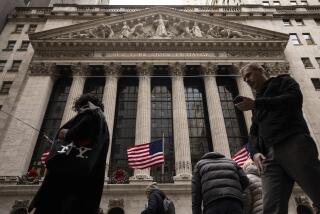Japan’s economy threatens return to recession
Already hurt by troubles in Europe and significant slowdowns in China and India, the U.S. and the global recoveries got another dose of bad news: Japan’s long-sluggish economy is threatening to slide back into recession.
The world’s third-largest economy shrank 3.5% at an annualized rate in the third quarter — the worst drop in gross domestic product since the country was battered by an earthquake and tsunami in March 2011.
The unexpectedly grim report Monday out of Tokyo prompted analysts to scale back Japan’s growth forecasts for the near term.
Analysts now predict an additional but smaller contraction in the final quarter of the year. Two consecutive quarters of negative growth, by one common definition, would constitute a recession.
“This is another nail in the coffin for a global economic slowdown,” said Sung Won Sohn, an economist at Cal State Channel Islands.
While Japan isn’t a major driver of global growth in the way that the U.S. and China are, its downturn is nonetheless likely to be felt, particularly by states such as California, which has long benefited from Japanese trade, tourism and investments.
Japan had enjoyed a moderate pickup in the last year, thanks to a recovery in private consumption and massive fiscal spending for reconstruction after the 2011 disaster.
But Japanese consumers clamped down after the end of government auto subsidies. Consumer spending, which makes up nearly two-thirds of the Japanese economy, shrank 0.5% in the quarter. Spending also has been under pressure from an aging and shrinking population.
Meanwhile, the nation’s export-dominated economy has been severely distressed by weakened demand from Europe and China, where a territorial dispute over a group of uninhabited islands in the East China Sea sparked a massive Chinese boycott of Japanese goods.
Toyota Motor Corp. and Nissan Motor Co., two of Japan’s leading exporters, have reported huge sales declines in China. Japanese companies also have been hampered by a persistently strong yen.
With shipments and profits down, business investments and capital spending fell sharply in the quarter.
“The jobs market remains subdued, consumer and business sentiment is low and incomes are moving sideways,” said Matthew Circosta, who follows Japan’s economy for Moody’s Analytics in Sydney, Australia.
An easing of the debt crisis in Europe could help the Japanese economy grow next year, and China’s economic slide of nearly two years may have bottomed out in October, according to the most recent government data.
Still, analysts shaved their forecasts for growth in Japan’s GDP — the value of goods and services produced in the nation — after Monday’s disappointing report.
Moody’s now sees Japan growing by just 0.6% next year, down from 1% in its October projection. And other experts warned that the outlook could turn darker depending on Japan’s island dispute with the region’s 800-pound economic gorilla.
“Any delay to the global recovery and further deterioration in China-Japan relations continue to pose significant downside risks to our forecasts,” Izumi Devalier, an economist for HSBC, wrote in a research note Monday.
The poor Japanese data add to the shadow cast on any significant rebound in the global economy.
While the U.S. economy is continuing to grow modestly, fears about impending fiscal spending cuts and tax hikes threaten to hamper one of the last big world economies still standing. That’s what makes the latest Japanese numbers all the more worrisome.
As an export nation that has long run a surplus, “Japan’s never been a big center of demand [for the world]. But it’s happening at the same time that the EU is committing suicide and China and India are slowing dramatically,” said Clyde Prestowitz, an Asia expert and president of the Economic Strategy Institute in Washington. “I think it’s bad,” he said. “We’re talking about the third-largest economy in the world.”
Pierson reported from Beijing and Lee from Washington.








